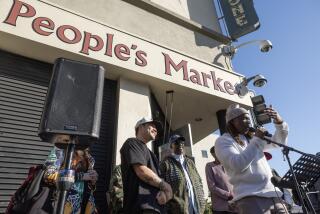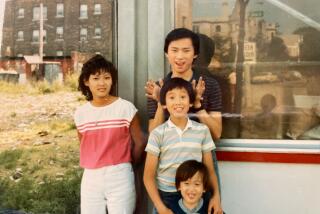Newton: Culture clash in Chinatown
At one level, the debate over whether to allow Wal-Mart to open a grocery store in Chinatown seems like a big fuss over something fairly small. The store would be just 33,000 square feet and would sell only groceries and sundries; it would not be a “superstore.” The new market would create some jobs and offer some inexpensive products, but it would hardly revolutionize the local economy or bring relief to a food desert. Chinatown already has more than a dozen markets, as well as bakeries and other food outlets.
What gives the debate its intensity, then, is not so much the stakes as a clash of underlying principles. Wal-Mart supporters emphasize that the company proposes to open a legal business in a space specifically zoned for a grocery store; if such an idea violates Los Angeles’ approach to acceptable development, then what does that say about this city’s receptivity to growth and jobs?
The company’s opponents counter that many Chinatown residents have grave misgivings about the project’s potential threat to local businesses and the character of the community. If it’s allowed to go forward, they wonder, what does that say about the ability of neighborhoods to protect themselves?
Behind this local debate is a larger context: Wal-Mart is fiercely opposed by organized labor, which has fought it around the world. Labor is working with community activists in Chinatown to try to keep the retailer from establishing a foothold in Los Angeles, where unions have great sway.
Over the last week, I spent four days walking through Chinatown and talking to residents and business owners about the project. What I found was a distinctly divided community. Some of those I spoke with liked the idea of Wal-Mart coming to the area: Cheaper food, they said , would be welcome, especially at a time when many are stretching budgets. Many more of the people I spoke to, though, opposed it. They worried about the erosion of their neighborhood’s integrity and history, and they expressed concern that the new supermarket would drive local stores out of business.
Rita Lee was sitting outside the Thien Hau Temple on a hot morning last week, accompanied by her daughter and mother. Across the way, a few elderly men and women practiced tai chi, as others opened shops or hurried to work beneath parasols. Lee said she would have mixed feelings about a Wal-Mart in the neighborhood. “It’s convenient,” she said, noting that she now sometimes travels more than half an hour to buy staples. But Lee also worried that local businesses might be hurt.
I heard that blend of reactions over and over. The owner of a nearby electronics store welcomed the prospect of increased foot traffic. The manager of a local bakery worried that it would siphon away customers. The assistant manager at the Wing Hop Fung Ginseng and China Products store thought it might draw people to Chinatown.
“A lot of people are talking about it,” said the assistant manager, Lisa Quan, adding that her store’s inventory — heavily stocked with foods and spices used in Chinese cooking and medicine — seemed unlikely to overlap much with a Wal-Mart supermarket. Wal-Mart is not known for its wild Ohio ginseng.
Others were less sanguine. Christilily Chiv grew up in Chinatown, went off to school at UC Riverside and now is back. Her parents still live there. As we strolled through the neighborhood, she pointed to restaurants and stores owned by family and friends. She’s alarmed by what a Wal-Mart might do to the character of the community.
“This is a cultural hub,” she said. “If the community becomes commercialized, it loses its integrity.”
That’s also the view of Sarah Tseng, who graduated last year from UCLA and now lives in Chinatown. As we sat down for tea, she ordered in Chinese. Tseng, who’s active in the campaign to reject the Wal-Mart store, was particularly bothered by the willingness of the city to ignore the wishes of her neighbors. “I feel like it’s a violation of due process,” she said.
Sissy Trinh runs the Southeast Asian Community Alliance, a neighborhood advocacy group that’s been around for 10 years. She echoes those concerns, as well as the fear of what Wal-Mart might do to the economy of this community. “What if Wal-Mart brings 50 jobs, but we lose 100 when other businesses close?” she asked.
On Tuesday, the City Council’s Planning and Land Use Management Committee will consider a motion by Councilman Ed Reyes to halt all new national chain-store development in Chinatown until the community has a chance to consider the proposal. As it’s been debated, Reyes says he’s heard from business leaders who resent his intervention, young people who appreciate the defense of their family stores and others worried about traffic and other effects. Mostly, though, he hears from those who want to preserve the singularity of Chinatown.
“What Chinatown means to the people of Chinatown,” Reyes said. “This issue of character and identity is real.”
Jim Newton’s column appears Mondays. His latest book is “Eisenhower: The White House Years.” Reach him at jim.newton@latimes.com or follow him on Twitter: @newton_jim.
More to Read
A cure for the common opinion
Get thought-provoking perspectives with our weekly newsletter.
You may occasionally receive promotional content from the Los Angeles Times.







